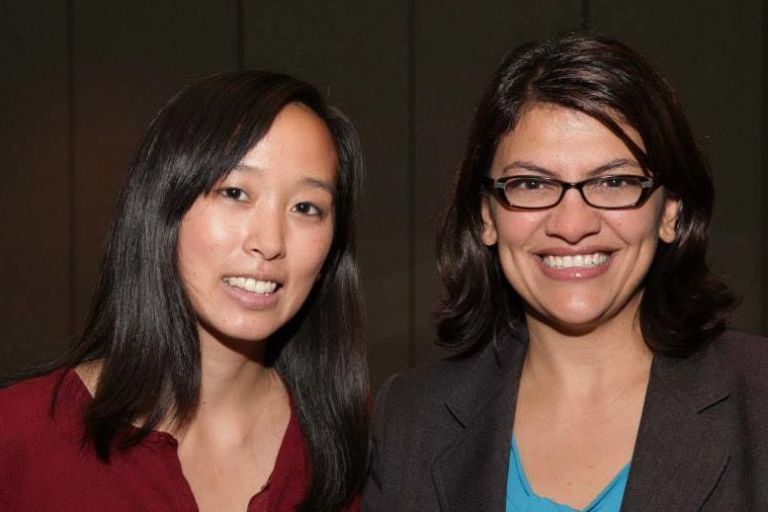State Rep. Stephanie Chang Knocked on Every Door in Her District—Twice
How the first-generation citizen became the first Asian-American woman in the Michigan State Legislature. (Won second time in 2016)
by Mattie Kahn
I’m the daughter of Taiwanese immigrants, which I do think has really shaped my values. I’ve always believed in opportunity for everyone, because that’s the reason my parents came here, that’s the promise of this country. Growing up, I was taught to notice when things weren’t fair for us or for other people, to notice when things weren’t equal. And as I got older and began to explore my own Asian-American identity, it brought my attention to civil rights and social justice issues.
I studied psychology and minored in Asian Pacific Islander American Studies in college, but I must have changed my mind, like, five times my senior year about what I wanted to do. By the end, it was probably pretty clear. I missed my own commencement for a union-organizing training, which basically landed me a job as a field organizer for a union. That was 2005.
At the time, we knew at the time that [businessman and anti-affirmative action campaigner] Ward Connerly was likely to bring his anti-affirmative action initiative to Michigan. I ended up deciding [to fight] the effort, foregoing this pretty secure union organizing job to volunteer and work part-time at a daycare. Thankfully, that turned into a job. I went to work with One United Michigan [a coalition that opposed the anti-affirmative action initiative], and we tried to defeat Proposal 2 [an amendment that would institute the ban state-wide] in 2006.
And then we lost. I’m a born-and-raised Michigander. I love this state. But that was very hard, to basically lose affirmative action state-wide. I realized a lot of my friends were leaving, moving across the country. But I decided I really wanted to stay because I realized we had so many important issues to work on. And if I couldn’t work to address them in my own state… It felt like a call to action—to keep working on social issues, to stay in Michigan, to try to make things better for the communities that I grew up in.
It was my predecessor, Rashida Tlaib, who asked me to run. She’s a good friend of mine, and we’ve worked together on a few issues. I said no the first time. Actually, I said no the first few times. But she recruited a few people to convince me, and we sat down over lunch and started talking about it. That was around 2013. Basically, that lunch was the beginning of a six-month process of talking to different people about whether or not I should run, the pros and cons. I had a lot of the questions that I think a lot of women have: “Do I know enough? Am I qualified? Will I be able to raise money?” And I had, in a way, philosophical questions, too. As a young Asian-American woman in a district that’s predominantly African-American, I thought to myself, “Even if I could win, is this the right thing for me to do?”
Ultimately, I decided that running would allow me to take the issues I was working on to the next level, to try to make a much greater impact. I still don’t necessarily see this as a career change; it’s one more way I can try to address some of the issues that my community faces.
It turns out I love knocking on doors and talking to voters everyday! I personally knocked on every door in our whole district twice. It was great. It was really uplifting, and I think it propelled me forward. It gave me a much better appreciation for what challenges people were dealing with in their lives and at home.
Obviously, there were definitely moments where I would get frustrated or just be physically exhausted, but having Sean, my husband, there to support me was so crucial. And supporters make a huge difference. I remember I was out once and I happened to see this negative mailer that one of my opponents had just sent out. I saw it in someone’s door. It’s very upsetting. I shed a few tears, and, literally the next minute, this car drove by and a bunch of supporters shouted, “Hey Stephanie! We’ve got your back.” It immediately reminded me that I was doing this for them, no matter what people wrote about me.
Since getting elected, I haven’t experienced outright blatant sexism, but women make up less than 25 percent of the legislature, which means that there are just fewer of us to bring up the issues and perspectives that we need to. That’s our job, and that’s okay, but it’s always a little bit of an uphill climb to let people know what those perspectives are. I’ve found you have to say it over and over.
Last week, I reintroduced earned paid sick time legislation. I want to make sure every worker gets access to paid sick time; it’s such an important issue for women, and really for everyone, because it shouldn’t that people basically have to choose between paying bills and taking care of themselves or a sick child. People are going to work sick, getting customers or colleagues sick, not getting better and back to work as quickly as they could be. It’s not right and it’s not good for families.
And just broadly, a lot of the issues I’m focused on are related to criminal and environmental justice and to getting a quality education for every kid. I have a 19-month-old. I don’t have a lot of down time, but when I love helping her with blocks and reading to her. I love watching her learn, and I want every kid to have that. I will say one of the highlights of my week is to go to a baby music class with her every Saturday morning. I get to watch her dance around, listen to music, try to sing. That’s what it’s all about.
This interview has been edited and condensed.
 Stephanie Chang
Stephanie Chang
 Stephanie Chang (L) and Rashida Tlaib.
Stephanie Chang (L) and Rashida Tlaib.
 Stephanie Chang, meeting with constituents in Michigan.
Stephanie Chang, meeting with constituents in Michigan.
Note:
The statistics aren’t good. According to recent estimates, women make up just under 20 percent of Congress and less than 25 percent of all state legislatures. Only six of our nation’s governors are women. But we are 51 percent of the population. And the research shows that when women participate in government, we make it run better, more collaboratively. Historically, women have needed to be convinced to enter politics. But within weeks of the 2016 presidential election, thousands of women announced they plan to run. And we want them to win. So we’re giving them a weekly example of a woman who has run and won. The point: You can, too.
Stephanie Chang was elected Michigan’s 6th District Representative in 2014, becoming the first Asian-American woman ever to serve in the Michigan State Legislature. Born to Taiwanese immigrants, Chang is a proud public school–educated first-generation American. And no matter her future in politics, she promises she’ll always be an activist.
Mar 9, 2017
Source from http://www.elle.com/culture/career-politics/news/a43727/stephanie-chang-michigan-interview/
Posted in 03/2017
For more information, please click : Who’s Who >>> 102. Stephanie Gray-Chang 張理





